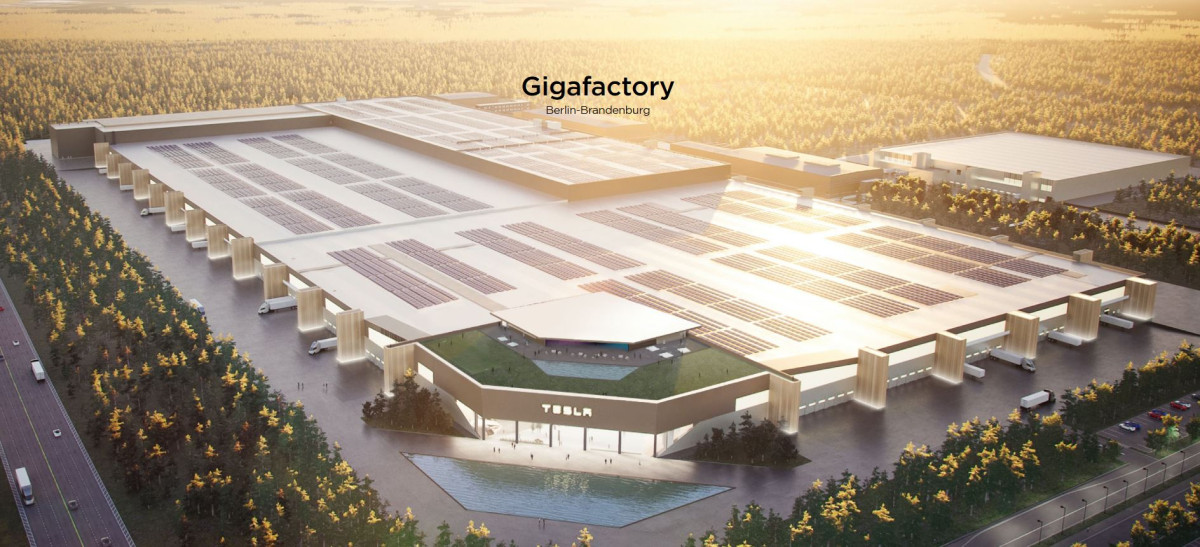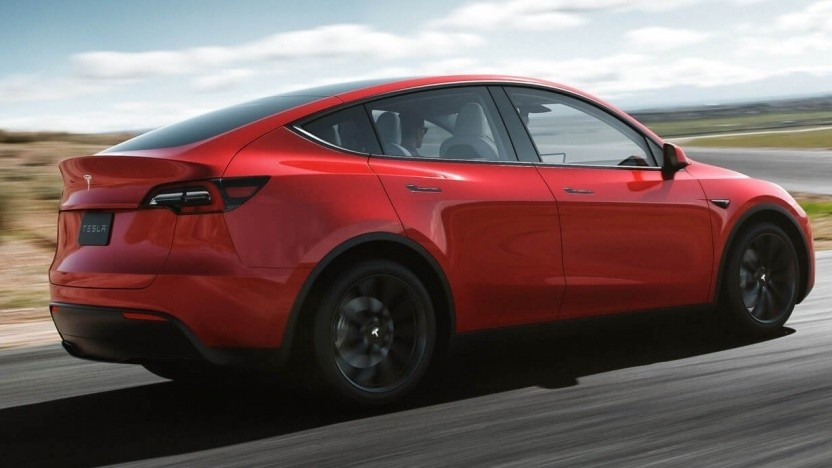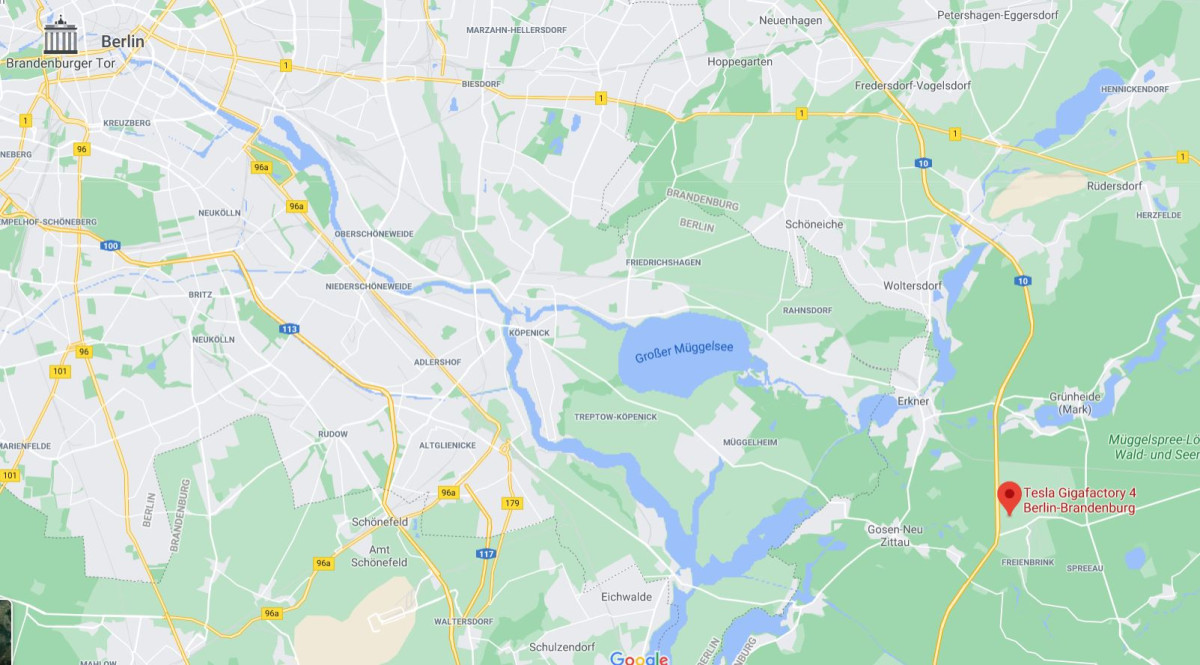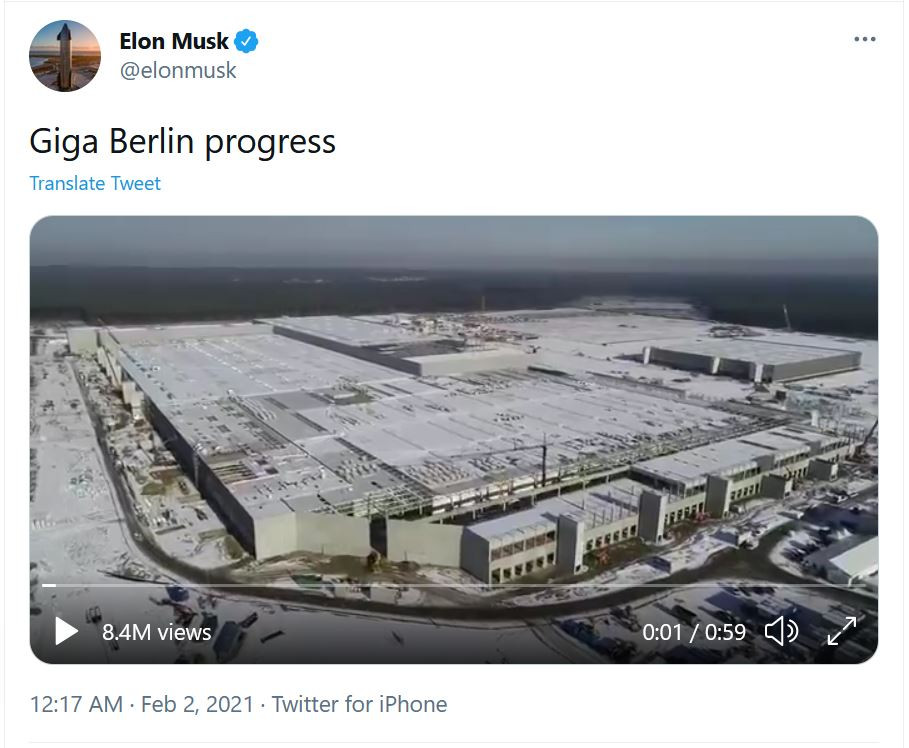Tesla's Berlin gigafactory will accelerate shift to electric cars
A bombshell announcement
Tesla's surprise announcement that it will build its fourth gigafactory near Berlin hit Germany's car industry like a bombshell. The company's flamboyant CEO, Elon Musk, casually dropped the news in late 2019 on a stage in Berlin after being awarded a "Golden Steering Wheel" award for the Tesla Model 3. "I actually have an announcement, which I think will be hopefully well received. We've decided to put the Tesla Gigafactory Europe in the Berlin area," Musk told a gasping audience, which included top managers from Germany's carmakers, who were described as shell-shocked. "I come to Berlin a lot," Musk told the crowd. "Berlin rocks!"
The excitement hasn't subsided since. Popular Berlin radio station radioeins introduced a special jingle to alert listeners to news on the project, which has been dubbed a "declaration of war" against the country's car establishment. Germany's trio of carmaking groups - Volkswagen (which includes Porsche and Audi), BMW and Mercedes-Benz - fell into disrepute with large parts of the public and the government following its emission manipulation in the dieselgate scandal, and because of its initially hesitant move to electric mobility. In a country where climate change often tops voters' concerns following unprecedented heat waves, droughts and the Fridays for Future protest movement, clean mobility advocates have welcomed Tesla's plans as "a huge gain for the mobility transition" (see more reaction quotes below).
Many people also pin great hopes on the factory's economic effects. The state of Brandenburg, which surrounds the capital Berlin and houses the plant, is a structurally weak region with few employment opportunities. It is desperate for new jobs as many will be lost during Germany's coal exit – the mining industry remains one of the state's most important employers. The regional government aspires to turn the area into a future mobility and energy transition hotspot, and showcases the Tesla location as a main focus alongside broad issues, such as digitalisation and education. The media frenzy is also fuelled by Musk's publicity stunts on Twitter, where he suggested the plant should have "a mega rave cave," a swimming pool on the roof, and be "filled with graffiti art."
But not everyone is welcoming Tesla with open arms, and local protests against the factory have received broad media coverage. Many observers also expect a clash with Germany's powerful metalworkers union, which has more than two million members and has warned Tesla over its record of fighting unionisation.
"The most advanced high-volume e-car production plant in the world"
The Berlin plant will be Tesla's first major production facility in Europe, and its fourth so-called gigafactory – others already operate in Nevada, New York and Shanghai. The term gigafactory was coined by Musk to describe his company's plans for the giant battery factory in Nevada – it's basically a marketing phrase that has taken on a life of its own.
Official Tesla communication on the project is relatively sparse, but it says that "Gigafactory Berlin-Brandenburg will be the most advanced high-volume electric vehicle production plant in the world."
The opening was originally planned for July 2021, but had to be postponed because of construction delays and outstanding clearance by authorities. The final permit was granted on 4 March 2022. But before Tesla can start production, it must fulfil numerous conditions concerning water use and air pollution control.
The California-based company says it will launch production with the Model Y, a fully electric, mid-size SUV. Once the initial expansion phase is complete, the factory is set to employ up to 12,000 people, who will produce 500,000 cars per year for the European market, according to Tesla plans. The company invests 5 billion euros in the project, according to media reports.
To put these production figures into perspective: The Wolfsburg Volkswagen Factory -- the group's headquarters and "the world's largest single car manufacturing complex" with a surface area of 6.5 km2 --produced just over 700,000 cars in 2018, according to the company. All German carmakers combined made 428,000 electric vehicles in 2020 in the country (fully battery electric and plug-in hybrids combined), and exported 62 percent of them.
World's largest battery factory?
The Tesla Berlin car plant's primary manufacturing areas include the press shop, foundry, body shop, paint shop, powertrain manufacturing, seat manufacturing and final assembly. Tesla also wants to turn the site into the world's largest battery cell production plant. CEO Musk said an annual production capacity of up to 100 gigawatt hours (GWh) was possible, "and then possibly" increase to 200 or 250 GWh. A plant with an annual capacity of 100 GWh alone could produce enough batteries for 1.3 million model Y vehicles with a 75 KWh battery.
Tesla plans to make new "4680 cells" measuring 80 by 46 mm (hence the name) with a higher energy density at the Berlin plant. In January 2021, the EU paved the way for state aid for the battery project, but Tesla withdrew the application in November 2021. Battery production could start in roughly two years, Brandenburg economy minister Jörg Steinbach, who was instrumental in bringing Tesla to the region, said in February 2021.
The site
The site is located in the sparsely populated and largely forested municipality of Grünheide, around 35 kilometres south-east of Berlin, where Tesla bought a plot of land measuring about 3 km2 that had been reserved for an industry project for around 20 years. BMW considered building a car plant at the same site two decades ago, but eventually opted for Leipzig instead.
To lure employees to the site, Tesla stresses its "natural surroundings" close to the "vibrant city of Berlin."
Tesla says convenient accessibility will be ensured by an extensive infrastructure of bicycle ways, roads and highways, and direct train connections. The site is located very close to an autobahn and will have a dedicated exit. The construction of a plant railway station for freight logistics is also planned to achieve the highest possible share of rail in freight traffic, according to the Brandenburg state government. Tesla is also considering using additional space in a nearby logistics centre. The company plans to establish an engineering and design centre in Berlin itself. Berlin's new airport is around 35 kilometres away.
Building without a permit
Getting the final permit for the factory was a long and drawn-out process. German law allowed the company to proceed with construction and the basis of provisional licences, in spite of outstanding questions regarding the factory's environmental impact, and Tesla largely completed the car factory before receiving final permission. Tesla would have been forced by law to dismantle the construction and reforest the area if it would have been denied.
The approval process was largely determined by Germany's Federal Immission Control Act (Bundesimissionsschutzgesetz - BlmSchG), which aims at limiting environmental damages. The law allows the start of construction before final approval if 1) a positive decision can be expected; 2) there is a public interest in the early start; and 3) the applicant "undertakes to compensate for all damage caused by the construction of the facility up to the time of the decision and, if the project is not approved, to restore it to its previous condition." In accordance with the law, Tesla made a 100-million-euro deposit in January 2021 to ensure that the site could be restored to its original condition before construction began.
It was widely expected that Tesla would eventually be granted a final permission. Brandenburg's economy minister Steinbach told Bloomberg in February that he was "totally relaxed" regarding the approval. In another interview, he said it was "very, very unlikely" that Tesla will not get the final nod.
Red tape and government support
In April 2021, Tesla criticised that slow approval processes for German industry and infrastructure projects stand in the way of urgent climate action efforts, as the carmaker continued to wait for the final approval. “Tesla Brandenburg has experienced first-hand that obstacles in German approval law slow down the necessary industrial transformation and thus the transport and energy transition,” wrote the Tesla subsidiary in a statement released as part of a legal case at the regional higher administrative court.
The authorities' approval process might appear to be slow, but is extremely fast by German standards. Getting the necessary approvals to build a single wind turbine can take several years in the country. The rapid progress at the Tesla factory also contrasts sharply with Berlin's new airport, which only opened in late 2020 following a delay of almost a decade.
The speed of the project is partly due to Tesla being prepared to take large financial risks. But the relevant authorities have also made great efforts to allow a rapid realisation. Shortly after the announcement that Tesla had chosen this location, the state government launched a dedicated task force to coordinate and speed up the project, without interfering in the approval process. The task force includes not only all affected ministries and Tesla delegates, but also local representatives.
"I am pleased that Brandenburg shows with Tesla how our laws and funding opportunities can also be used to get things done in a short time," chancellor Angela Merkel told Redaktionsnetzwerk Deutschland in late 2020.
Former federal economy minister Peter Altmaier promised Musk that the government will help Tesla in any way possible to get the plant ready as soon as possible. “We are very proud of your car plant in Brandenburg and we wish you good luck with that,” Altmaier told Musk. “You’ll have every assistance you need.”
Environmental concerns
Most local opposition is centred on environmental concerns relating to the plant's water usage, the clearing of a local forest and increased traffic.
Large chunks of the planned factory sit within a designated water protection zone. Tesla has taken various steps to lower the amount of water it originally intended to use, including switching the heating system from gas to heat pumps, using a different cooling system and other optimisations, the government has said.
The parts of the forest that needed to be cleared to make room for the factory were not naturally grown, but a monoculture pine forest planted for cardboard production. Tesla has said it will overcompensate the clearing of the forest with reforestations elsewhere in the region. To minimise the impact on the local fauna, Tesla relocated bats and reptiles, as well as 21 ant nests. The company also installed 368 nesting boxes for bats and 329 for birds.
To ease the flow of road traffic and minimise emissions, the backbone for both freight transport and employees' commute will be rail connections, the government says. Authorities are also working on a concept to connect the site to public transport via cycle lanes.
Brandenburg is a strong producer of wind and solar electricity, and the plant's energy demand will be covered as much as possible with locally and regionally generated renewable energy. "Natural gas is to be used only in the paint shop and the foundry, because electrification would not be efficient there," the government has said. A photovoltaic system on the factory roof is also part of the energy concept.
Brandenburg state premier Dietmar Woidke said the region's strong renewable power production – the highest generation per capita in Germany – was a decisive factor in negotiations with Tesla.
Local resistance
A large majority of the region's inhabitants welcome the project. Eighty-two percent of Brandenburg's residents were in favour of building the factory, according to a survey conducted in February 2020. But the factory is set to transform the local municipality of Grünheide, which currently has a population of around 9,000 people only. Some local residents oppose the project, and their resistance has been widely covered in the media.
Many critics took issue with the start of construction despite pending licenses. At a public hearing, which was part of the approval process, critics complained that the state's environmental agency had already signalled there would be "no general obstacles to the licensing procedure," even though more than 400 submitted objections had not yet been officially refuted. The number of objections is common for a project of this size, the government has said.
“When I found out in November 2019 what Tesla and the authorities were planning, I immediately decided to fight,” Grünheide resident Frank Gersdorf, who lives about 800 metres from the site and is spokesperson of a citizen initiative, told Berlin magazine ExBerliner. “It was clear to me that the nature and the livelihood of the people here would be destroyed.” He also told start-up magazine Sifted: "A whole area has been transformed from a place of holidays and recreation into a gigantic industrial region — and that isn’t an exaggeration.”
Germany's Green Party and major environmental organisations came out in favour of the project, distancing themselves from local activists. “Conservationists are interested in intact nature, not in industrial forests,” said Kai Niebert, head of an environmental NGO umbrella group.
Other local residents are also in favour of the project, hoping it will accelerate infrastructure and connectivity development. “It’s long overdue,” Christine de Bailly told ExBerliner. “We’ve been working for a long time, trying to get the train to stop here more often and improve the bus services.”
Property prices in the area shot up as investors were planning to build new houses for Tesla employees. But some nearby localities refused to have new properties built.
What does it mean? Reactions and commentary
Economy minister Peter Altmaier called Tesla's announcement in late 2019 a "milestone" for the roll-out of electric mobility and the production of battery cells in Germany. He said the investment will "enhance Germany's status as an automobile industry location on an international level."
"The German Association of the Automotive Industry (VDA) explicitly welcomes that Tesla is coming to Germany. It's good for the business location and shows its high competence," VDA head Hildegard Müller told a conference in early 2021. "Many suppliers will benefit. We're leading Europe in the production of electric cars," she added.
"You can hardly think of another investment that would be more useful to the car nation number one," Volkswagen CEO Herbert Diess said in a social media post in early 2020. "From battery cells and electric vehicles to the digitalisation of the car and autonomous driving - Tesla is a key driver. Volkswagen AG welcomes the new neighbourhood, because it makes it easier for us to create the German ecosystem for the automotive engineering of the future." He added: "That kind of healthy competition makes Germany better and more innovative."
“Elon Musk is going where his strongest competitors are, right into the heart of the global auto industry,” Jürgen Pieper, a Frankfurt-based analyst with Bankhaus Metzler, told Bloomberg in early 2020. “No other foreign carmaker has done that in decades given Germany’s high wages, powerful unions and high taxes.”
“Locating the plant in Germany gives Tesla an expensive but highly qualified workforce," said automotive analyst at GlobalData Calum MacRae in late 2019. “There is a huge amount of value in the automotive manufacturing and supply chain clustered on Germany that Tesla can draw upon, and the ‘Made in Germany’ tag still carries significant weight in the premium car market.”
"The Berlin location serves two unique goals," said Gene Munster, managing partner at venture capital firm Loup Ventures, in late 2019. "It's strategic to lure German automotive talent to Tesla, and it's a statement that Elon wants to one-up auto companies from that region."
Tesla's decision is "a huge gain for the mobility transition and the transformation of the German car industry,” Christian Hochfeld, head of clean mobility think tank Agora Verkehrswende*, told Clean Energy Wire in 2019. "Tesla puts German carmakers under pressure in the shift to green mobility and will give them a run for their money."
"Musk's decision to build a plant in Germany must be seen as a declaration of war. … Tesla's decision to produce cars in Germany means the race for electric car supremacy is now underway in the same country where the car engine was first invented," Henrik Böhme commented on Deutsche Welle in 2019.
"The e-car pioneer long laughed at by German competitors is attacking Volkswagen, Daimler and BMW head-on on their home market - as a producer, employer, engineer," wrote German mobility newsletter Tagesspiegel Background in 2019.






